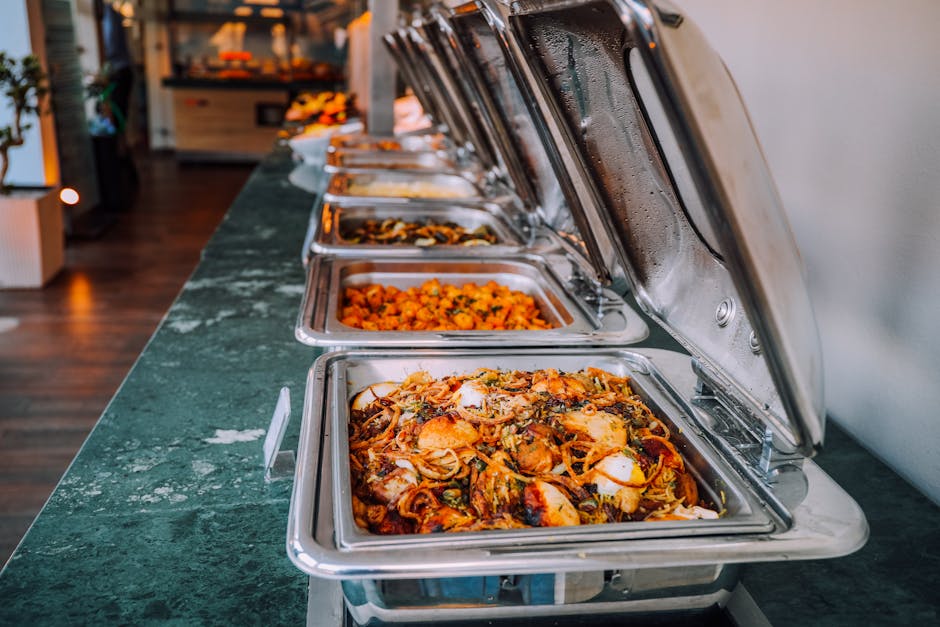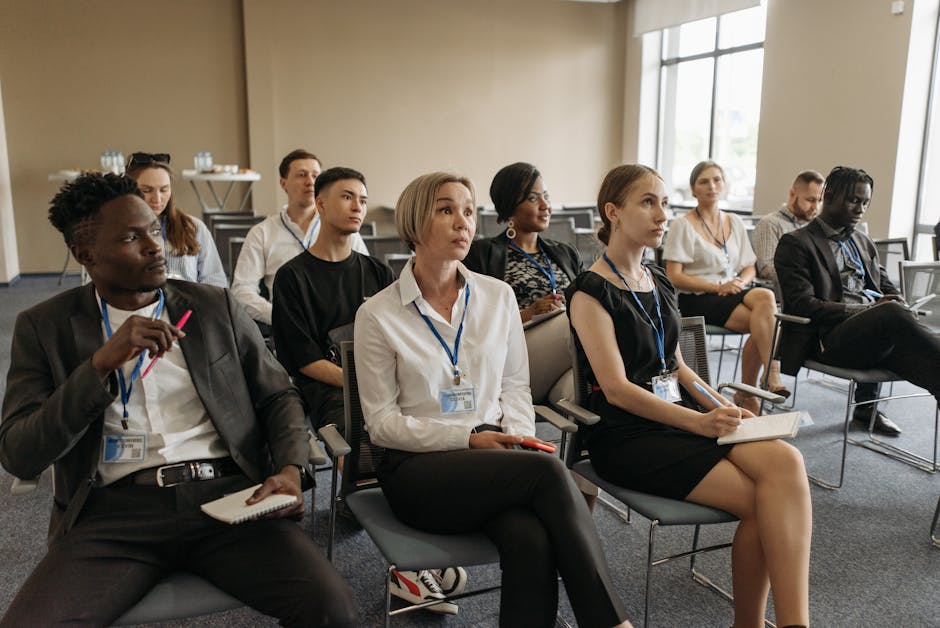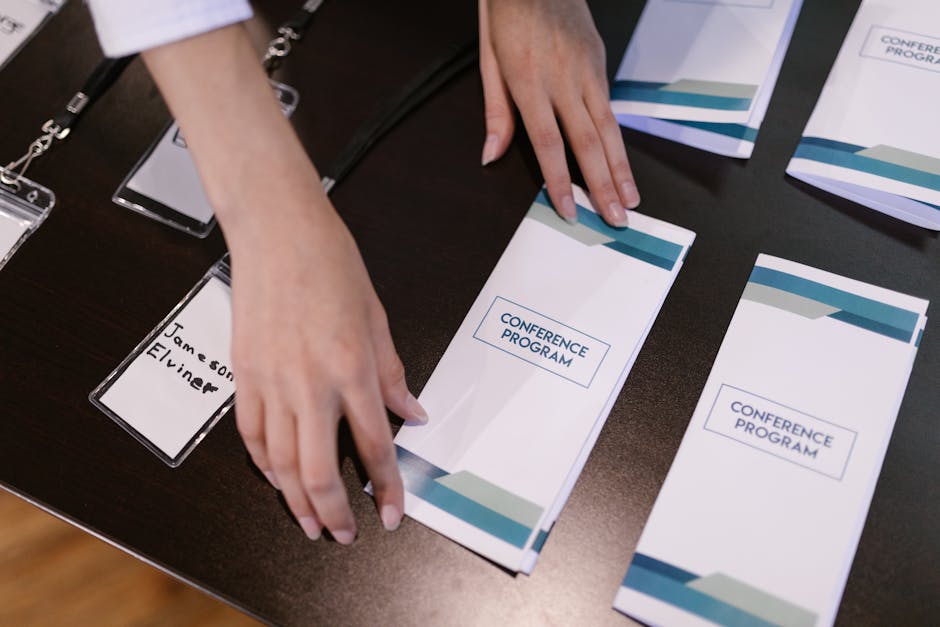
A Guide to Planning the Perfect Corporate Event in Montreal

Source: images.pexels.com
Understanding the Corporate Event Planning Process in Montreal
Overview of Corporate Event Planning
Corporate event planning involves a series of well-coordinated steps aimed at creating an engaging and effective gathering for businesses. These events can range from small team-building sessions to large conferences and product launches.
Successful corporate event planning encompasses several key components:
Goal Setting: Identifying the purpose of the event, whether it's to celebrate a company milestone, launch a new product, or strengthen team dynamics.
Audience Analysis: Understanding who will attend helps in tailoring the experience to meet their preferences.
Logistics Coordination: This includes selecting venues, arranging catering, managing equipment needs, and coordinating communication.
Feedback and Evaluation: Post-event assessment is crucial to measure success and improve future events.
In a city like Montreal, cultural uniqueness adds an extra layer to the planning process.
Specifics of Planning an Event in Montreal
Planning an event in Montreal offers a vibrant backdrop but requires specific considerations. The city is known for its rich culture, stunning architecture, and diverse culinary scene, making it an appealing destination for corporate events. Here are some specifics to consider:
Local Venues: From historic hotels to innovative conference centers, the variety of venues can significantly influence the atmosphere of your event. For example, the Palais des congrès de Montréal is a key venue that provides modern facilities alongside artistic murals, reflecting the city’s culture.
Culinary Choices: Montreal is a food lover’s paradise. Choosing a menu that features local delicacies such as poutine or smoked meat sandwiches can delight attendees.
Cultural Considerations: Since Montreal is bilingual, recognizing the linguistic diversity can enhance the event experience. Offering bilingual materials and signage can make a significant difference to attendees.
Networking Opportunities: Capitalize on the city’s rich professional landscape by inviting local experts and influencers to participate in discussions or panels.
Montreal’s vibrant atmosphere combined with a structured planning process can lead to unforgettable corporate events that resonate well with attendees. Planning with a focus on these specific elements can set your event apart in this bustling, dynamic city.

Source: images.pexels.com
Setting Objectives and Budgeting for Your Corporate Event
Defining Event Objectives
With a lively city like Montreal serving as your backdrop, the very first step in corporate event planning is to define your event's objectives clearly. Understanding what you hope to achieve should guide all further decisions and strategies.
Here are some common objectives to consider:
Networking Opportunities: Is the goal to connect employees and clients? Make sure to facilitate conversations and interactions that foster relationships.
Brand Awareness: Perhaps you want to promote a new product or increase your brand's visibility. Incorporating creative displays and informative sessions can do wonders.
Education and Training: If you're planning a seminar or workshop, the objective might be to share knowledge and improve skills.
When setting these objectives, you might reflect on a past event. For instance, at one event, the aim was to improve team morale, and by incorporating team-building activities, the feedback revealed stronger collaboration among employees. Even small objectives have a significant impact!
Creating a Realistic Budget
Once the objectives are clear, budgeting comes next. Crafting a realistic budget is crucial to ensure your event's success without overspending.
Consider the following steps when budgeting:
Identify Major Expenses:
Allocate a Contingency Fund: Always anticipate unexpected costs by setting aside approximately 10-15% of your total budget.
Gather Quotes: Obtain estimates from various vendors. This not only gives you a realistic idea of costs but also allows for negotiations.
Tracking Expenses: Utilize a spreadsheet to document all anticipated expenses versus actual costs. This will help keep a close watch on your financial commitments.
By doing these tasks, such as meticulous tracking and regular reassessment, you can avoid the pitfalls of exceeding your budget. For instance, during one event planning experience, revisiting the budget midway allowed the team to pivot and adjust, ultimately saving costs while still meeting objectives.
In the end, clearly defined objectives paired with practical budgeting create a solid foundation for a successful corporate event in Montreal.

Source: images.pexels.com
Finding the Perfect Venue in Montreal for Your Corporate Event
Types of Venues Available
Now that objectives and budgeting are firmly in place, it’s time to dive into one of the most exciting aspects of event planning: finding the perfect venue in Montreal. The city offers a plethora of options to suit various needs and atmospheres. Here are some popular types to consider:
Convention Centers: Venues like the Palais des congrès de Montréal are equipped with state-of-the-art facilities ideal for large conferences and exhibitions.
Hotel Ballrooms: Many hotels in Montreal, such as the Ritz-Carlton, offer elegant ballrooms perfect for formal dinners or corporate galas.
Unique Spaces: From historic sites to art galleries or even warehouses repurposed as event spaces, options like La Vitrine or the Montreal Science Centre can provide a memorable backdrop.
Outdoor Venues: If your corporate event falls during the warmer months, consider spaces like Parc Jean-Drapeau, where you can enjoy stunning views of the city skyline.
Choosing the right venue can set the tone for your entire event!
Factors to Consider When Choosing a Venue
Selecting the venue that aligns perfectly with your corporate event goals involves several important factors:
Capacity: Ensure the venue can accommodate your expected number of attendees comfortably. There’s nothing worse than a crowded space or too much emptiness!
Location: Accessibility is key. Venues near public transport or downtown areas can make it easier for attendees to arrive. Consider mentioning its proximity to attractions as an added benefit.
Facilities and Technology: Look for venues that meet your technical needs, such as audio-visual equipment, Wi-Fi, and sufficient staging areas for speakers.
Ambiance: The venue’s atmosphere should reflect your brand's identity. A tech firm might prefer a modern, sleek environment, whereas a more traditional company may want a classic ballroom setting.
Catering Options: Check if the venue provides catering or allows you to bring in your preferred service, keeping in mind dietary preferences.
When planning an event at a unique venue last year, the team learned that ambiance greatly impacts attendee experience. By choosing an art gallery, they created an engaging atmosphere that inspired creativity and conversation.
Incorporating these considerations into your venue search will help ensure that your corporate event in Montreal is not only memorable but also perfectly aligned with your event objectives.

Source: images.pexels.com
Catering and Menu Selection for a Successful Corporate Event
Understanding Dietary Restrictions
As the search for the perfect venue wraps up, the next essential aspect to focus on is catering. Food can make or break an event, and understanding dietary restrictions is crucial in ensuring that all guests feel catered to and valued.
Here are some common dietary restrictions to keep in mind:
Vegetarian/Vegan: Many individuals choose plant-based diets, so including delicious vegetarian and vegan options is not just considerate; it can also shine a light on your commitment to inclusivity.
Gluten-Free: With increasing awareness of celiac disease and gluten intolerance, offering gluten-free options ensures that attendees who require these choices don’t have to be sidelined.
Nut Allergies: Be mindful of serious nut allergies. Clearly labeling dishes will prevent accidental exposure and potential emergencies, enhancing guest comfort.
Dairy-Free: Similar to gluten, lactose intolerance affects many people. Offering dairy-free alternatives can make meals more enjoyable for those individuals.
Incorporating a diverse menu is key. A personal experience comes to mind where, at a recent corporate retreat, they offered a well-rounded buffet that included plenty of options for various dietary needs. The feedback was overwhelmingly positive, showing that attendees appreciated being considered.
Choosing the Right Catering Service
Once dietary needs are understood, selecting the right catering service becomes paramount. Here are some tips for making that choice:
Reputation and Reviews: Check reviews and ask for recommendations. A caterer with a solid reputation ensures that quality and service will meet your expectations.
Menu Customization: The ideal caterer should be flexible. They should work with you to create a customizable menu that aligns with your event objectives and attendee preferences.
Tastings: Don’t hesitate to request tastings before making a decision. It's an opportunity to gauge quality and presentation first-hand.
Service Style: Decide whether you want buffet service, plated meals, or food stations. This can shape the overall flow and style of the event.
By considering these factors when selecting catering and combining this with a well-thought-out menu that acknowledges dietary restrictions, you can create an unforgettable dining experience at your corporate event. A well-fed guest is often a happy guest, which can lead to meaningful connections and memorable interactions throughout the event.

Source: images.pexels.com
Entertainment and Activities to Engage Attendees at Your Event
Options for Corporate Event Entertainment
With your catering and menu selection in place, the next step in creating a memorable corporate event in Montreal involves planning entertainment and activities to engage your attendees. Good entertainment can set the tone for the event and keep the energy lively.
Consider the following options for corporate event entertainment:
Live Bands or DJs: Music can create a vibrant atmosphere. Hiring a local band that plays popular hits or a DJ familiar with current tracks can help keep attendees on the dance floor, fostering a sense of community.
Guest Speakers: Thought-provoking talks from industry leaders can not only inspire your audience but also add value to the event. A well-known guest speaker can draw attendees and spark conversations that extend beyond the event.
Interactive Performers: Think outside the box with options like circus acts, magicians, or dancers. These performers can roam the venue, engaging attendees and creating spontaneous interactions.
Photo Booths: A fun way to capture memories, a photo booth with props can encourage guests to let loose, providing laughter and mementos for them to take home.
Recalling an event where a local jazz band played during dinner, it left an impressive mark on attendees and became a topic of conversation long after the event concluded.
Planning Engaging Activities
Adding engaging activities can further heighten the experience for your attendees. Here are some ideas to consider:
Team-Building Exercises: Activities that promote teamwork and collaboration can strengthen bonds among colleagues. Activities like scavenger hunts or escape rooms encourage communication and problem-solving.
Workshops: Offering hands-on workshops related to your industry or professional development can keep attendees engaged while providing valuable skills.
Networking Activities: Design unique networking opportunities, such as speed networking or icebreaker games, which facilitate introductions and make connections easier.
Raffles and Prizes: Incentivizing participation with chances to win prizes can motivate attendees to engage fully in activities throughout the event.
Including these elements not only boosts engagement but also contributes to a more dynamic and enjoyable atmosphere. At one event, hosting a quick team-building contest combined with music resulted in laughter and a celebration of diverse talents, leaving attendees eager for the next event.
By carefully selecting entertainment and planning engaging activities, you create a corporate event that resonates with participants, ensuring they leave with fond memories and stronger connections.

Source: images.pexels.com
Marketing and Promotion Strategies to Ensure Event Success
Utilizing Social Media and Online Platforms
With all the details about entertainment and activities set, the next crucial step in ensuring your corporate event's success is marketing and promotion. In today’s digital age, leveraging social media and online platforms can help you reach a wider audience and create excitement around your event.
Consider these effective strategies:
Create an Event Page: Utilize platforms like Facebook or Eventbrite to create an event page. This acts as a hub for all information, where attendees can RSVP, ask questions, and receive updates.
Engaging Content: Post regular updates on social media. Share sneak peeks of what attendees can expect, such as behind-the-scenes preparations, highlights from guest speakers, or interactive activities planned.
Use Hashtags: Develop a unique and catchy hashtag for your event. Encourage attendees to use it when posting about the event, helping to generate buzz and visibility.
Live Streaming: If applicable, live-stream certain parts of your event on platforms like Instagram or Facebook to engage those who couldn’t attend, keeping them within your brand’s orbit.
Reflecting back to a tech conference, strategic posts on social media led to a record number of registrations. By showcasing the high-profile speakers scheduled to attend and highlighting engaging activities, excitement built up weeks before the event.
Collaborating with Local Influencers
Another powerful strategy is to collaborate with local influencers who resonate with your target audience. By partnering with these individuals, you can tap into their established followers for greater reach. Here’s how to go about it:
Identify Relevant Influencers: Look for local figures whose audience aligns with your event’s objectives. These could be industry experts, bloggers, or popular local personalities.
Host Pre-Event Collaborations: Engage influencers in the lead-up to the event through joint social media campaigns or co-hosted live sessions. This not only builds credibility but also expands your promotional reach.
Offer Incentives: Provide influencers exclusive access to the event, such as VIP passes or behind-the-scenes experiences, in exchange for their promotion. This makes them feel valued and more likely to share the event with their audience.
In a previous corporate event, collaborating with a local influencer who was well-regarded in the industry led to a substantial increase in registrations. Their enthusiasm for sharing the event on social media brought in attendees who may not have otherwise registered.
By effectively utilizing social media and collaborating with local influencers, you can craft a comprehensive marketing strategy that not only promotes your corporate event but also builds engagement and excitement long before the doors open. Consistency and creativity in these efforts will significantly enhance your event's visibility and overall success.

Source: images.pexels.com
Managing Logistics and Coordination on Event Day
Creating a Detailed Event Timeline
As the event day approaches, proper planning and organization become the linchpins of its success. By creating a detailed event timeline, you lay the groundwork for a smooth and efficient day. This document should outline every critical moment from the start of setup to the event's end.
Here are essential components to include in your timeline:
Setup Schedule: Specify when vendors should arrive and outline setup times for each area, such as registration, dining, and entertainment zones.
Daily Agenda: Break down the day minute by minute. For example, if the event starts at 9 AM, your timeline might include:
8:00 AM: Venue opens for setup
9:00 AM: Registration desk opens
9:30 AM: Welcome speech begins
10:00 AM: Keynote speaker starts
Break Times: Include clear intervals for meals, networking, and activities. This ensures everyone knows when to take a break and when to return.
Wrap-Up Activities: Don’t forget to plan for post-event wrap-up, such as thanking attendees and finalizing equipment returns.
In a previous event, a well-crafted timeline helped the team manage everything seamlessly. Guests were properly welcomed, the schedule stayed on track, and even the closing remarks went off without a hitch.
Coordinating Vendors and Staff
Coordination on the event day is crucial for maintaining flow and addressing any unexpected challenges. Here are some strategies to ensure everyone is on the same page:
Pre-Event Meeting: Gather all vendors and staff for a brief meeting on the day of the event. Outline the day’s timeline, their roles, and any specific expectations.
Designate Point Persons: Assign clear point persons for each area (e.g., catering, audiovisual, registration). This simplifies communication and ensures that issues are swiftly directed to the right individual.
Ongoing Communication: Use walkie-talkies or group messaging apps to maintain an open line of communication. This is especially useful for addressing real-time logistical issues or last-minute changes.
Establish a Problem-Solving Strategy: Prepare for potential problems by discussing how to handle common emergencies, such as equipment failure or unexpected delays. Encourage your team to remain flexible and adapt as needed.
From personal experience, frequent check-ins between the coordinators and vendors during past events have ensured that everyone stayed on task while adapting quickly to any changes.
By meticulously planning your timeline and ensuring effective coordination among vendors and staff, you pave the way for a successful event day. Smooth logistics reduce stress and create an environment where attendees can truly enjoy the experience you've curated.

Source: images.pexels.com
Evaluating the Success of Your Corporate Event in Montreal
Gathering Attendee Feedback
With your corporate event successfully wrapped up, one of the most important steps is evaluating its success. Gathering attendee feedback is crucial for understanding what worked well and what could be improved for future events. Honest feedback provides invaluable insights that can guide your planning for years to come.
Here are some effective ways to collect feedback from attendees:
Surveys: Create a concise post-event survey that attendees can fill out. Include both quantitative questions (like rating aspects from 1 to 5) and open-ended questions for more detailed feedback.
Interactive Q&A Sessions: During the event, consider holding an open forum or a casual Q&A session where attendees can share their thoughts in real-time. This allows for immediate engagement and might bring up insights you hadn’t considered.
Social Media Engagement: Encourage attendees to share their experiences on social media. Keeping track of comments on hashtags related to your event can help you gauge sentiment and gather spontaneous feedback.
In a previous corporate event, sending a follow-up email a few days later with a survey link yielded a 70% response rate. Attendees appreciated the opportunity to share their views, and the feedback was instrumental in refining future events.
Analyzing Key Performance Indicators
Alongside gathering feedback, analyzing key performance indicators (KPIs) helps quantify the event's success. KPIs provide measurable data related to your event objectives, such as attendance rates, engagement levels, and more.
Consider these critical KPIs to analyze:
Attendance Numbers: Compare the actual turnout against your anticipated numbers. Did you meet or exceed expectations?
Engagement Metrics: Look at how attendees interacted during the event. This could include session attendance, participation in activities, and interactions on social media.
Satisfaction Ratings: From the feedback collected, calculate average satisfaction scores. These ratings help quantify attendee enjoyment and can highlight specific areas needing improvement.
Return on Investment (ROI): Evaluate the financials by comparing the costs of hosting the event against the benefits, such as leads generated or sales made as a result.
In one corporate event I managed, tracking the satisfaction ratings alongside attendance figures helped us identify a specific breakout session that was a hit. By focusing on high-engagement areas, the event reinforced positive attendee experiences.
By effectively gathering attendee feedback and analyzing relevant KPIs, you can gain a comprehensive view of your corporate event's success. This information will not only help refine future events but also enhance your reputation as a planner who values attendee input and delivers quality experiences.

Source: images.pexels.com
Legal and Safety Considerations for Corporate Events in Montreal
Understanding Permits and Regulations
As you dive into planning your corporate event, there’s a critical aspect that often gets overlooked: the legal and safety considerations. In Montreal, understanding the necessary permits and regulations is essential to ensure your event runs smoothly and complies with local laws.
First and foremost, research which permits your event requires. Here’s a quick rundown of common permits that may apply:
Event Permit: If you’re hosting an outdoor event or using a public space, you might need a special event permit from the city. This process can take some time, so starting early is advisable.
Alcohol License: If you plan to serve alcohol, obtaining an alcohol permit is crucial. This typically involves filling out an application detailing your event and may include safety protocols for responsible serving.
Noise Permit: Hosting a lively event with music or entertainment might require a noise permit, especially if you're located in a residential area. Being proactive in addressing noise levels can prevent potential complaints.
A personal anecdote from an event I organized comes to mind. We were deep in preparations and had the venue booked, but overlooked the need for an outdoor event permit. Thankfully, a quick consultation with local authorities resolved the issue before the event day, allowing everything to go off without a hitch.
Additionally, be aware of capacity regulations set by the city. This dictates how many attendees can safely gather in a given space, ensuring crowd management is both effective and lawful.
Finally, it’s wise to familiarize yourself with local health and safety regulations, especially if your event involves food or activities requiring special precautions. These considerations not only protect attendees but also reflect positively on your organization’s commitment to safety.
By understanding and addressing the necessary permits and regulations early in the planning process, you can navigate the legal landscape confidently. This diligence will not only help in keeping your event legally compliant but also enhance the overall experience for all attendees, ensuring peace of mind as the event unfolds.

Source: images.pexels.com
Ensuring Event Safety and Security
As you wrap up the essential legal considerations for your corporate event in Montreal, the next pivotal factor is ensuring event safety and security. A secure environment fosters a positive experience for attendees and serves as a reflection of your organization’s commitment to their well-being.
Assessing Potential Risks
Before diving into logistics, it's crucial to conduct a thorough risk assessment. Identifying potential risks related to your event can inform security planning. Consider the following:
Venue Layout: Are there adequate exit routes? Assess how the location of entrances and exits might impact safety in case of an emergency.
Type of Event: Different events present different risks. A formal gala will have different security requirements compared to a large conference or outdoor festival.
Crowd Size: Estimate the number of attendees and review the venue’s capacity limits. Overcrowding can lead to safety hazards, so being aware of this is key.
A memorable event I coordinated faced potential weather risk for an outdoor gathering. Thankfully, by planning for alternative measures upfront, such as a tent and clear communication with attendees on safety protocols, we ensured everyone remained safe and comfortable, regardless of the elements.
Implementing Security Measures
Once risks are identified, it's time to put security measures in place. Here’s how to bolster safety:
Hire Professional Security: For larger events, consider hiring professional security personnel, especially if alcohol will be served. Trained staff can monitor the venue and handle any situations that arise.
Emergency Protocols: Establish clear emergency procedures. This includes informing staff about how to manage emergencies and where exits are located. Displaying these protocols publicly can assure attendees of their safety.
Communication Systems: Equip staff with walkie-talkies or other communication devices to facilitate quick communication during the event. This ensures that everyone stays in sync with any unfolding situations.
Health and Safety Protocols: With evolving health guidelines, remaining up to date on health protocols is paramount. If your event includes food, for example, ensure that food safety regulations are being observed.
By conducting a comprehensive risk assessment and implementing robust security measures, you create a safe and welcoming environment for all attendees at your corporate event. In doing so, not only do you protect your participants, but you also enhance the overall experience, encouraging engagement and enjoyment all around. Remember, a well-secured event lays the foundation for lasting positive impressions!